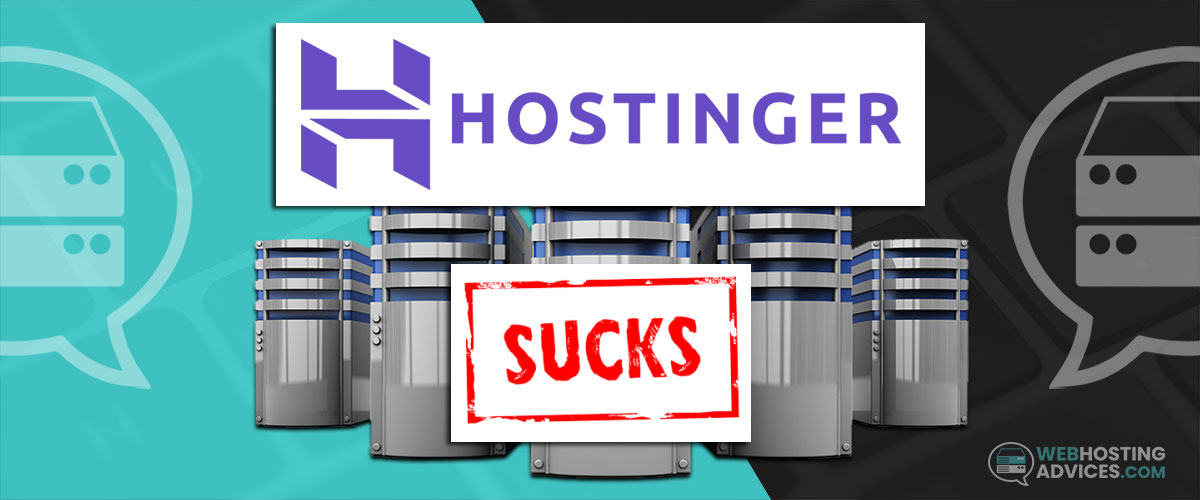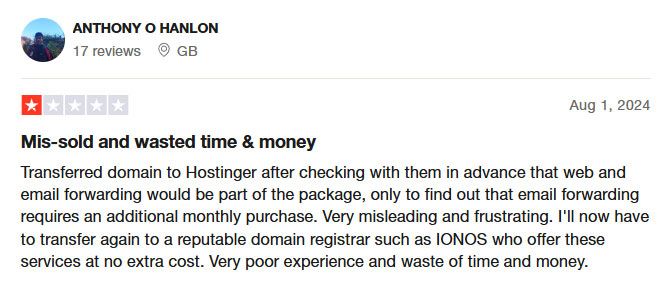Are you disappointed with Hostinger’s services? Do you think that Hostinger sucks? If yes, you’re not alone. Many Hostinger customers are frustrated with its hosting.
The reasons for this dissatisfaction vary for different people.
In this article, we’re covering all the major problems you might face when using Hostinger for your website. We’ll also answer some of the most frequently asked questions about the host by the end of this article.
Let’s begin.
Why does Hostinger sucks?
Shared hosting, in general, has many inherent drawbacks. So we cannot expect perfection from shared hosting providers. But Hostinger has multiple issues and complaints that we cannot ignore.
We are discussing these Hostinger problems in detail below:
Fake Reviews
Hostinger has a lot of fake reviews on reputable online review sites like Trustpilot. The host has an average rating of 4.6 on Trustpilot with 85% of reviewers giving 5 stars.
But when you read the reviews from people giving poor ratings, you’ll notice repetitive issues.
As seen above, people are facing several issues with Hostinger but the company still gets a good rating on Trustpilot. This hints towards fake reviews secured by the hosting provider.
It is a cheap business practice to secure new customers.
Rather, Hostinger needs to focus on serving its current customers well by improving its service quality.
Mediocre Support
Another major problem with Hostinger is its customer support service. The hosting provider has an elementary support department that relies heavily on pre-written responses.
It lacks personalized service that would have addressed customer complaints quickly.
Have a look at the reviews from Hostinger customers on its support services:
From the above reviews, it is clear that Hostinger has a mediocre support department. The company doesn’t have knowledgeable support executives.
Additionally, the hosting provider takes unreasonable time to resolve customer issues.
Limited Resource Usage
Another area where Hostinger lacks is its server resources in hosting plans. The company offers minimal resources with its entry-level plan.
This forces its customers to upgrade their plans as the resources get exhausted quickly.
The screenshot below shows the server resources you’ll receive with different Hostinger plans:
The basic plan (Single), as seen above, supports only 10 entry processes and 25 active processes. It comes with a limited RAM of 768 MB only. Input/Output Operations Per Second (IOPS) are also restricted to a maximum limit of 64.
Let’s compare the availability of CPU cores on hosting plans offered by different hosting providers:
The above screenshot indicates that Hostinger offers the lowest CPU resource with its plans. You’ll get more server resources if you choose hosting plans from its competitors in the same price range.
Unreliable Email Service
Another vital issue with Hostinger lies in its email service. The hosting provider’s email servers have bad deliverability. Your emails will often fall into the spam folders of your subscribers instead of going to their inboxes.
Additionally, Hostinger servers are slow in sending and receiving emails.
Look at some reviews from Hostinger customers highlighting its email problem:
You’ll find many more reviewers complaining about the Hostinger email services. The company is unable to provide reliable email hosting to support your business.
It is best to utilize those email providers for your website who have specialization in their field. This will not only safeguard your important business communications but also help you with email marketing.
Sudden Account Suspension
Hostinger sucks because of its sudden account suspensions. The hosting provider does not even intimate its customers before suspending their accounts.
Often, it doesn’t offer any explanation or offer valid reason for account suspension.
Multiple Hostinger customers have faced business losses because of these sudden service blocks:
As seen above, Hostinger caused trouble to its customers by blocking their hosting services. The company doesn’t even feel the need to alert people beforehand or send warnings via email.
This is purely unprofessional on Hostinger’s part.
No Backups
Most hosting providers include free backups for your account in their hosting plans. They usually have backups of your website to support you in case of need.
However, it is difficult to rely on Hostinger if you lose your data for some reason. The hosting provider is unable to restore your website to a previous version as it does not maintain backups for your sites.
Its Premium web hosting plan includes weekly backups instead of daily schedules. These weekly backups are stored for 7 weeks. The higher-tier plans from Hostinger include automatic daily backups.
But these are maintained only for up to 7 days.
Conclusion
Hostinger is not worth it because of several reasons. Its unreliable email service, limited server resources, sudden account suspension, and poor customer support are the main problems.
That said, Hostinger is an economical choice for website owners due to its attractive plan prices. It remains a good option for hosting small websites like hobby sites or personal blogs.
However, it is advised to stay away from Hostinger for serious projects. Choose a reliable hosting provider when you plan to build a large website or an eCommerce store.
At the same time, we do not recommend using Hostinger email services even for your small website. Their email servers are very unreliable and will lead to multiple deliverability issues.
Consider choosing a specialized email service provider of your choice to get the best results.
FAQ (Frequently Asked Questions)
Why is Hostinger so slow?
Hostinger provides very limited server resources with its hosting plans. You’ll get low CPU and RAM compared to what other hosts offer in the same price range.
Hostinger also has low limits for entry processes and active processes.
Additionally, Hostinger supports minimal Input/Output Operations Per Second (IOPS). This slows down the overall operations of your website.
Has Hostinger been hacked?
Yes, Hostinger was once hacked in 2019. An unauthorized third party accessed one of its servers. The concerned server had an authorization token that allowed the hacker to get further access to Hostinger’s system.
This attack leaked the information of more than 14 million Hostinger customers. The company changed the account passwords of all affected customers soon after the breach.
Who owns Hostinger?
Hostinger is a Lithuania-based employee-owned hosting provider. The company was established in 2004 and named Hosting Media. Later, it was renamed as Hostinger in 2011.
A private equity company called ConHostinger has 30% of its stake. Daugirdas Jankus, a marketing expert, holds the current CEO position at Hostinger.
















